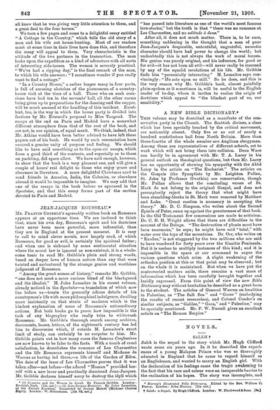JEAN-JACQITES ROUSSEAU.*
Mn. FRANCIS GRIBBLE'S agreeably written book on Rousseau appears at an opportune time. We are inclined to think that, since his own day, Rousseau's spirit and his doctrines have never been more powerful, more influential, than they are in England at the present moment. It is easy to call to mind clever novels, now largely read, of which Rousseau, for good or evil, is certainly the spiritual father; and when one is sickened by some sentimental situation where the moral law is ignored as non-existent, it is a whole- some tonic to read Mr. Gribble's plain and strong words, based on deeper laws of human nature than any that were twisted and caricatured by the strange genius and worthless judgment of Rousseau.
"Among the great names of history," remarks Mr. Gribble, "one does not meet a more curious blend of the blackguard and the idealist." M. Jules Lemaitre in his recent volume, already noticed in the Spectator—a translation of which now lies before us—treats the generally odious details of his countryman's life with more philosophical indulgence, dwelling more insistently on that strain of madness which is the kindest explanation of some of Rousseau's extraordinary actions. But both books go to prove how impossible is the task of any biographer who really tries to whitewash Rousseau. Mr. Gribble's thorough search among archives, documents, leases, letters, of the eighteenth century has led him to discoveries which, if outside M. Lemaitre's exact limit of study, can certainly be no surprise to him. Mr. Gribble points out in how many cases the famous Confessions are now known to be false to the facts. With a touch of cruel satisfaction, he demolishes the romance of Les Charmettes and the life Rousseau represents himself and Madame de Warens as having led there,—a life of the Garden of Eden. The date of the lease of Les Charmettes proves that it was taken after—not before—the adored "Maman" provided her- self with a new lover and practically dismissed Jean-Jacques. Mr. Gribble declares himself sorry to destroy the idyll which • (1) Rousseau and the Women he Loved. By Francis Gribble. London : Eveleigh Nash. [15s. net.]—(2) Jean-Jacques 12ousseau. By Jules Lemaitre, of the French Academy. Translated by Jeanne Mairet (Madame Charles Bigot). London : W. Heinemann. 1.125. ed. net.] "has passed into literature as one of the world's most famous love-stories," but the truth is that "there was no romance at Les Charmettes, and no solitude a dens."
After all, it does not much matter. There is, to be sure, something saddening in the thought that a man of poor Jean-Jacques's despicable, untruthful, ungrateful, neurotic character should have had power to change the world; but undoubtedly this is not always the work of moral heroes. His genius was purely original, and his influence, for good or for evil—it has not been all evil—will never really be lessened by any of the squalid revelations of his life. Mr. Gribble finds him "perennially interesting." M. Lemaitre says con- vincingly: "He acts upon us still." So he does, and this is the very reason why Mr. Gribble's book, almost painfully plain-spoken as it sometimes is, will be useful to the English reader of to-day, whom it invites to realise the origin of doctrines which appeal to "the blindest part of us, our sensibility."
































































 Previous page
Previous page